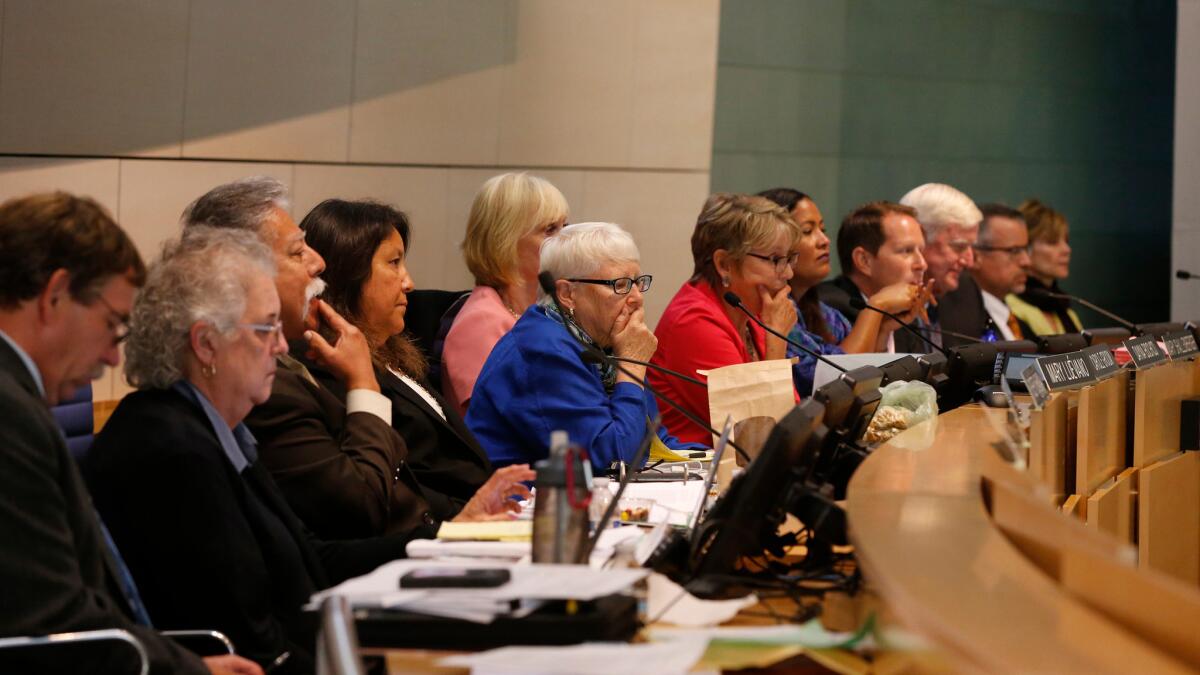California Coastal Commission should tighten management and billing practices, state review finds

- Share via
A state review of the California Coastal Commission recommended late last week that the powerful planning agency improve some of its management practices and billing procedures to avoid future budget shortfalls.
The California Department of Finance began its inquiry in June after the commission required a $1.45-million bridge loan from the state to pay its bills during a cash flow problem. It was the second such loan in two years.
The borrowing, which is a common practice in state government when shortfalls occur, was paid back before its October deadline.
Commission officials said at the time that the agency fell behind in receiving grant payments and reimbursements from local, state and federal sources due to personnel issues, the illness of a staff member and complexities of the billing process.
In what they called a non-audit review, finance officials evaluated the commission’s fiscal management and internal controls for the period of July 1, 2015, to June 30, 2016.
Released on Friday, the inquiry found that the agency’s billing system resulted in invoices staying open for more than 121 days and that a $79,998 payment did not reach its accounting unit until four months after it was sent to the commission.
About $2.7 million of the commission’s $22.8-million budget last year came from grant payments and reimbursements for work done for other governmental agencies, such as Caltrans.
Among other things, the finance department recommended that the commission centralize its billing practices, develop written procedures, adopt an invoice schedule and increase the frequency of its billings to speed up the collection of money due to the agency.
“Because of the varying processes and various staff performing them, no unit is fully accountable for coordinating and ensuring timely billing and collections,” the 31-page review stated.
In a written response to the findings, commission officials said they agreed with all 11 recommendations and would immediately address them. They added, however, that the staff would have to be increased to fully implement the recommendations.
The commission attributed the cash flow problem to several retirements and a resignation that resulted in a complete turnover of staff in the accounting unit. This was complicated by a new state government accounting system and delays in getting data needed for billing invoices.
“It is likely that some cash flow problems will continue to be an issue every June” when the state fiscal year ends, the commission stated. “We recommend the Department of Finance consider an ongoing year end cash flow loan” to give the agency time to collect payments.
The review further recommended that the commission develop other budgeting approaches to raise funding rather than rely on payments from utilities and private companies in return for expedited work related to their projects.
Finance officials stated that the payments give the appearance of a conflict of interest and raise the question of favoritism on the part of the commission. The agency received $375,000 in such payments for fiscal year 2015-16.
Though it agreed with the recommendation, the commission issued a sharp rebuttal, stating that the finance department and the state Legislative Analyst’s Office had encouraged the agency to take that approach to diversify its revenue sources. Agency officials added that there were no actual conflicts of interest.
In addition, the review urged the commission to consistently issue annual performance evaluations of staff members in writing, increase collaboration between commissioners and the agency’s executive director to clarify their roles, ensure that institutional knowledge is not lost because of retirement of veteran staff members and reduce the number of employees who have more than 640 hours of leave on the books.
Follow me on Twitter @LADeadline16
ALSO
Can a $100,000 grant revive the Triforium, L.A.’s ‘weird, strange beacon’?
From immigration to short-term housing to street vendors, L.A. City Hall faces a heavy agenda
Massive Orange County coastal development goes before California Supreme Court
UPDATES:
3:35 p.m.: This article was updated with additional comment from the Coastal Commission.
This article was originally published at 11:30 a.m.
More to Read
Sign up for Essential California
The most important California stories and recommendations in your inbox every morning.
You may occasionally receive promotional content from the Los Angeles Times.











